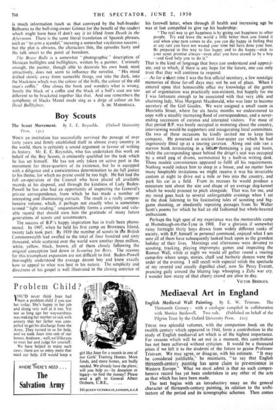Boy Scouts
The Scout Movement. By E. E. Reynolds. (Oxford University Press. I Ss.)
WHEN an institution has successfully survived the passage of over forty years and firmly established itself in almost every-country in the world, there is certainly a sound argument in favour of writing its history. Mr. E. E. Reynolds, who has undertaken this work on behalf of the Boy Scouts, is eminently qualified for the task which he has set himself. He has not only taken an active part in the movement for three-quarters of its existence, but he is equipped with a diligence and a cotfscientious determination to do fikll justice to his theme, for which no praise could be too high. He has had the full co-operation of the Council who have placed all available records at his disposal, and through the kindness of Lady Baden- Powell he has also had an opportunity of inspecting the General's private correspondence, from which he has made a number of interesting and illuminating extracts. The result is a really compre- hensive volume, which, if perhaps not exactly what is sometimes termed " light reading," unquestionably forms a complete and valu- able record that should earn him the gratitude of many future generations of scouts and scoutmasters.
The success of B.P.'s happy inspiration has in truth been pheno- menal. In 1907, when he held his first camp on Brownsea Island, twenty lads took part.' By 1939 the number of scouts in Ole British Commonwealth had swelled to the total of four hundred and sixty thousand, while scattered over the world were another three million, white, yellow, black, brown, all of them closely following the original conception laid down in Scouting for Boys. The reasons for this triumphant expansion are not difficult to find. Baden-Powell thoroughly understood the average decent boy and knew exactly how to appeal to what was best in his nature. The simplicity and directness of his gospel is well illustrated in the closing sentence of
his farewell letter, when through ill health and increasing age he was at last compelled to give up his leadership: "The real•way to get happiness is by going out happiness to other
people. Try and leave the world a little better than-you found it and when-3,0113,4nm comes to die, you can die. happy in feeling that at any rate you have not wasted your time halt have:done your best. Be prepared in this way to live happy and to die happy—stick to your scout promise always—even after you have ceased to be a boy —and God help you to do it."
That is the kind of language that boys can understand and appreci- ate, and to which, if there is any hope for the future, one can only trust that they will continue to respond.
As for i-sitort time I was the first official secretary, a few nostalgic memories of those far-off days may not be out of place. When 1 entered upon that honourable office my knowledge of the gentle art of organisation was practically non-existent, but happily for me I was fortunate enough to be associated with that very able and charming lady, Miss Margaret Macdonald, who was later to become secretary of the Girl Guides. We were assigned a small room in Henrietta Street, where for six hectic months we endeavoured to cope with a steadily increasing flood of correspondence, and a never- ending succession of curious and interested visitors. For most of that period B.P. was busily occupied in motoring about the country, interviewing would-be supporters and inaugurating local committees. On two of these occasions he kindly invited me to keep him company. He possessed an ancient four-seater car which he had ingeniously fitted up as a touring caravan. Along one side ran a narrow bunk .terminating in a letkerttontaining a jug and basin, while the corresponding space behind the driy.er's seat was occupied by a small lies; of drums, surmounted by a built-in writing desk. Those modest conveniences appeared to fulfil all his requirements. Nothing would induce him to sleep in a house, and no matter how many hospitable invitations- we might receive it was his invariable custom at night to drive out a mile of two into the country, and park his car in a field. From its recesses he would produce a miniature tent about the size and-shape of an average dog-kennel which he would proceed to pitch alongside. That was for me, and my mind goes back to several unforgettable evenings when I sat in the dusk listening to his fascinating tales of scouting and big- game shooting, or obediently repeating passages from Sir Walter Scott's poems for which he had an old fashioned but whole-hearted enthusiasm.
Perhaps the high spot of my experience was the memorable camp at Humshaugh-on-the-Tyne in 1908. For a glorious if somewhat rainy fortnight thirty boys drawn from widely different ranks of society, with B.P. himself in personal command, enjoyed what I am sure all of them have subsequently looked back upon as the grandest holiday of their lives. Mornings and afternoons were devoted to scouting, tracking, playing impromptu games and inspecting the Roman Wall, while at night we would all gather round a roaring camp-fire where songs, stories, chaff and .barbaric dances were the order of the evening. I still recall with especial relish the spectacle of my revered and usually dignified _chief, now Sir Percy Everett, prancing gaily around the blazing logs whooping a Zulu war cry. I wonder how many of that cheery crowd are alive to day.
VICTOR BRIDGES.


































 Previous page
Previous page